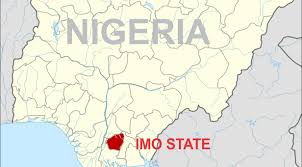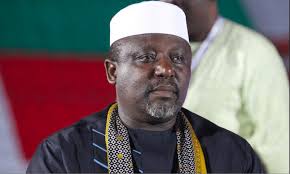President Muhammadu Buhari’s admonition to striking university lecturers which he gave during the last Salah celebrations has again brought the issue to the front burner. The five-month Academic Staff Union of Universities (ASUU) strike was eclipsed from the minds of the nation by party primaries and their uncertainties, and politicians who always think more of the next election and their personal gains than public good shifted attention to the thing that mattered to them most. Unabashedly, Labour Minister Chris Ngige who could not resolve the strike was among those who stretched out their hands, albeit unsuccessfully, for the presidency. And so, negotiations got stalled.
In his home town Daura, during a Salah visit of some governors to him, President Buhari, like the army general he is, had ordered the lecturers back to their classes, thundering in the loudest voice he could muster, “Enough is enough”. The president, as a person, might not have been privy to the extent the Federal Government’s negotiations with ASUU had gone, but having expressed his concern about the grounded activities in our citadels of learning, he is ostensibly telling the nation that he is eager to see the students back to school. The president felt for the students and their parents. It’s amazing, though, that he could not issue the same enough-is-enough order to his constituency, the politicians, governors, ministers and all, who have their children and wards schooling all over Europe and America. Because they have the privilege to get around the problem other parents are facing, they have adopted the devil may care attitude to the generality of crises in the nation’s education sector.
Certainly, the common Nigerian knows that in a rating of frequency of strikes and agitation, no union would compare with the ASUU. Records are that at a time in the life of the nation, universities were under lock and key for more than a year at a stretch, courtesy of ASUU strike. That meant that an average student was then set more than one year backwards. A body of statistics making rounds of late has shown that, since this unbroken democratic dispensation that began in 1999, ASUU had gone on strike for a total of 63 months, totalling approximately seven years. The cumulative effect of these incessant strikes is that graduates of these universities, despite spending extra years to graduate, often enter into the society as something worse than half-baked professionals and academics. This has its multiplier effects on the nation as our future engineers, doctors, lawyers or even lecturers end up giving the nation substandard services.
A cursory look at the serial ASUU strikes would show that some demands had recurred several times and several times the federal government had reneged on agreements on those demands. ASUU demands, in fairness to the lecturers, bothered on both their welfare/emoluments and the tools of work for the smooth running of the universities. The sad experience is that at the call-off of the strikes, ASUU would end up getting none of the contents of the agreement from an adamant and insensitive Federal Government.
Ridiculous, though, is the ding dong battle over mode of payment of the salaries of the lecturers. The Federal Government wants to pay the lecturers using the automated method they call Integrated Personnel and Payroll System (IPPS) which they feel is in tandem with its adopted revenue pooling system they call single treasury account . The lecturers preferred a different method, behaving like the IPPS was a kind of plague. There is a plausible argument that an employee might not be in the position to dictate to the employer how best he could be paid. From indications, regardless of labour laws, the employee-employer relations are far from being democratic. It appears the Nigerian lecturers are enjoying the privilege of a rare democratic atmosphere in their dealings with their employers.
What is baffling, however, in the Nigerian milieu, is that private universities are in session and their students are being taught on schedule. They do not have the problem of workers’ strike and there are no extraneous demands by lecturers. Should we assume that they run their universities better than the almighty Federal Government that has huge oil and tax revenue at its disposal?
Even more curious is that the private universities appear to pray for ASUU strikes, perhaps because most of the ASUU lecturers who are full time employees of the public universities are adjunct lecturers in the private universities. The implication is that when they are on strike, their full attention shifts to the private institutions. It also stands to reason that the lecturers enjoy the strikes because it gives them ample opportunity to make extra money. Indeed, those not engaged in adjunct jobs do their other businesses conveniently. They later return to receive pay for work not done in their respective public universities.
The FG’s lack of capacity to run the universities smoothly lends credence to the cries for total restructuring of the country’s political structure and wealth distribution in line with the principles of true federalism. Obviously the FG is carrying too much of the national burden and showing too little capability to handle them all.
Much of the argument in the public space is that the lecturers are paid pittance in comparison to the humongous cash made available to politicians, be they governors, legislators or mere councillors of local government areas. No doubt, there has been monumental corruption in government, both official and unofficial ones, the major reason for government inability to meet its obligations. Indeed, Nigerians should no longer continue to tolerate the voracious appetite for public funds on the part of their politicians who transform to public office holders and gulp the common wealth at the detriment of the masses. In some cases, the government takes away unjustifiable money only to satisfy the caprices of the president and his men. The phenomenon, though abhorrent, can be vigorously fought on a pedestal different from industrial actions. It is untidy that lecturers or any other group of workers would base their demand for fatter pay packet on the corruption going on in government. And to grant such requests might amount to worsening the inflationary trend in the country. When ASUU gets a raise, NASU lists its demands and asks for parity. Health workers will be at another corner flexing muscles.
Inasmuch as government is to blame for reneging serially on agreements with lecturers, ASUU members have either to exercise their prerogative to remain on strike or find another reason to go back to school for the sake of the students and their weary parents. Many of the students need to be salvaged from despair, especially those who had hoped to graduate shortly when the strike happened. Some of them at home have taken to crime and prostitution out of frustration. At a point, accusing fingers might point at the lecturers for also being insensitive to the plight of the Nigerian students if they do not return to classes. They are the teachers, the politicians aren’t. If the Federal Government turns a deaf ear, the lecturers should show more maturity. Seriously, there could be other ways to better the lot of universities and students, away from the government inputs. What if the lecturers play themselves out of relevance as soem of the students have planned to abandon school either to be engaged in unintended marriage or to seek fortune elsewhere?
The education sector is in dire need for positive change as the number of employable graduates from our universities has become a far cry from what is required. This is cyclic because the half-baked graduates will in future return to the universities to teach other students.
Perhaps, the ultimate solution to this quagmire, and many other problems besetting the country, is quick restructuring so that federating units can handle some of these responsibilities on the shoulder of the Federal Government. Zones where these universities fall into should be allowed to run them.
ASUU members should go back to classes, knowing how obdurate some administrations can be, so as to stop causing students and their parents pain.
Dr. Odu can be reached via dirimrich2018@gmail.com









